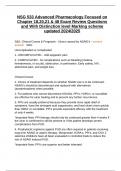NSG 533 Advanced Pharmacology Focused on
Chapter 18,20,21 & 48 Exam Review Questions
and With Distinction level Marking scheme
updated 2024/2025
S&S, Clinical Course & Prognosis - Ulcers caused by NSAID's - correct
answer S&S:
Uncomplicated vs complicated
1. UNCOMPLICATED - mild epigastric pain
2. COMPLICATED - GI complications such as bleeding (melena,
hematemesis, or occult), obstruction, or perforation. Early satiety, N/V,
abdominal pain, and weight loss.
Clinical Course:
1. Choice of treatment depends on whether NSAID use is to be continued.
NSAID's should be discontinued and replaced with alternatives
(acetaminophen) when possible.
2. For patients who cannot discontinue NSAIDs, PPI's, H2RA's, or sucralfate
are effective for ulcer healing and to prevent any further recurrences.
3. PPIs are usually preferred because they provide more rapid relief of
symptoms, have the strongest acid suppression, and heal ulcers more quickly
than H2RA' or sucralfate. PPI's provide equivalent efficacy with the treatment
of only 4 weeks.
*Important Note: PPI therapy should only be continued greater than 4 weeks if
the ulcer is confirmed to still be present or if the patient develops severe
complications from PUD.
4. Prophylactic regimens against PUD are often required in patients receiving
long term NSAID or aspirin therapy. Misoprostol, H2RA's, PPI's, and COX 2
selective inhibitors have all been evaluated in controlled trials to reduce the
risk of NSAID induced PUD.
*Important Note: PPI's are superior and better tolerated.
,Prognosis:
1. May require long term therapy of PPI or H2RA if severe complications
secondary to PUD such as gastric outlet obstruction occur, or those who need
to be on an NSAID or high dose corticosteroids and are at high risk for
bleeding.
Ulcers caused by Stress-Related Mucosal Damage (SRMD) - Risk Factors &
Pathogenesis - correct answer Risk Factors:
1. Physiological stressful situations that lead to SRMD include sepsis, organ
failure, prolonged mechanical ventilation, thermal injury, and surgery.
Pathogenesis:
1. SRMD occurs most frequently in critically ill patients due to mucosal defects
caused by gastric mucosal ischemia and intraluminal acid.
2. Ulcers are usually superficial but may penetrate into the submucosa and
cause significant bleeding.
Ulcers caused by Stress Related Mucosal Damage (SRMD) - S&S, clinical
course and prognosis. - correct answer S&S: Same as others should
symptoms develop.
Uncomplicated vs complicated
1. UNCOMPLICATED - mild epigastric pain
2. COMPLICATED - GI complications such as bleeding (melena,
hematemesis, or occult), obstruction, or perforation. Early satiety, N/V,
abdominal pain, and weight loss.
Clinical Course:
,1. Prevention of stress ulcers involves maintaining hemodynamic stability to
maximize mesenteric perfusion and pharmacologic suppression of gastric acid
production.
2. Weigh risks vs benefits of acid suppression, especially PPI's in low-risk
patients.
3. Stress ulcer prophylaxis is only indicated in ICU patients with certain risk
factors - see Table 18-4.
Prognosis:
1. Depends on risk factors to SRMD
Identify the desired therapeutic outcomes for patients with H. Pylori
associated ulcers and NSAID induced ulcers - correct answer Therapeutic
outcome - H. pylori:
1. Complete eradication.
Therapeutic Outcome of NSAID-induced ulcers and PUD therapy:
1. resolve symptoms,
2. reduce acid secretion
3. promote epithelial healing
4. prevent ulcer related complications and ulcer recurrence
Identify factors that guide selection of an H. pylori eradication regimen and
improve adherence with these regimens - correct answer *Key Notes on H.
pylori eradication regimen:
1. Eradication should be pursued in all patients who test positive for H pylori
infection.
2. Several regimens are recommended for first-line eradication therapy.
, 3. Different antibiotics should be used if the second course of H. pylori
eradication is required.
Factors that guide selection:
1. Allergy to Penicillin and previous exposure to macrolide antibiotics.
2. Evidence-based first-line regimens include Bismuth quadruple therapy and
concomitant therapy
3. Alcohol consumption - Caution with the use of metronidazole.
4. Bismuth Based Four Drug Regimens - Have clinical cure rates similar to
three-drug PPI regimens.
5. Factors affecting decreased adherence include polypharmacy, need for
frequent drug admin or long-term treatment duration, and use of drugs that
may cause intolerable side effects.
Appropriate management for a patient taking a nonselective NSAID who is at
high risk for ulcer related gastrointestinal complications (GI Bleed) or who
develop an ulcer. - correct answer Appropriate Management:
**Consider age
1. Avoid exposure to factors that worsen the disease.
2. Avoid cigarette smoking and drinking
3. Discontinue NSAID or replace it with acetaminophen. For patients who
cannot discontinue, PPI's, H2Rs, or Sucralfate are effective.
4. PPIs are usually preferred as they provide more rapid relief, have the
strongest acid suppression, and heal ulcers quicker than H2RA's or
Sucralfate.
5. Consider prophylactic regimens in those taking long term NSAID or aspirin
therapy.
a. Misoprostol, H2RA's, PPI's, and COX-2 selective inhibitors have been
evaluated in controlled studies to reduce the risk of NSAID-induced PUD.





